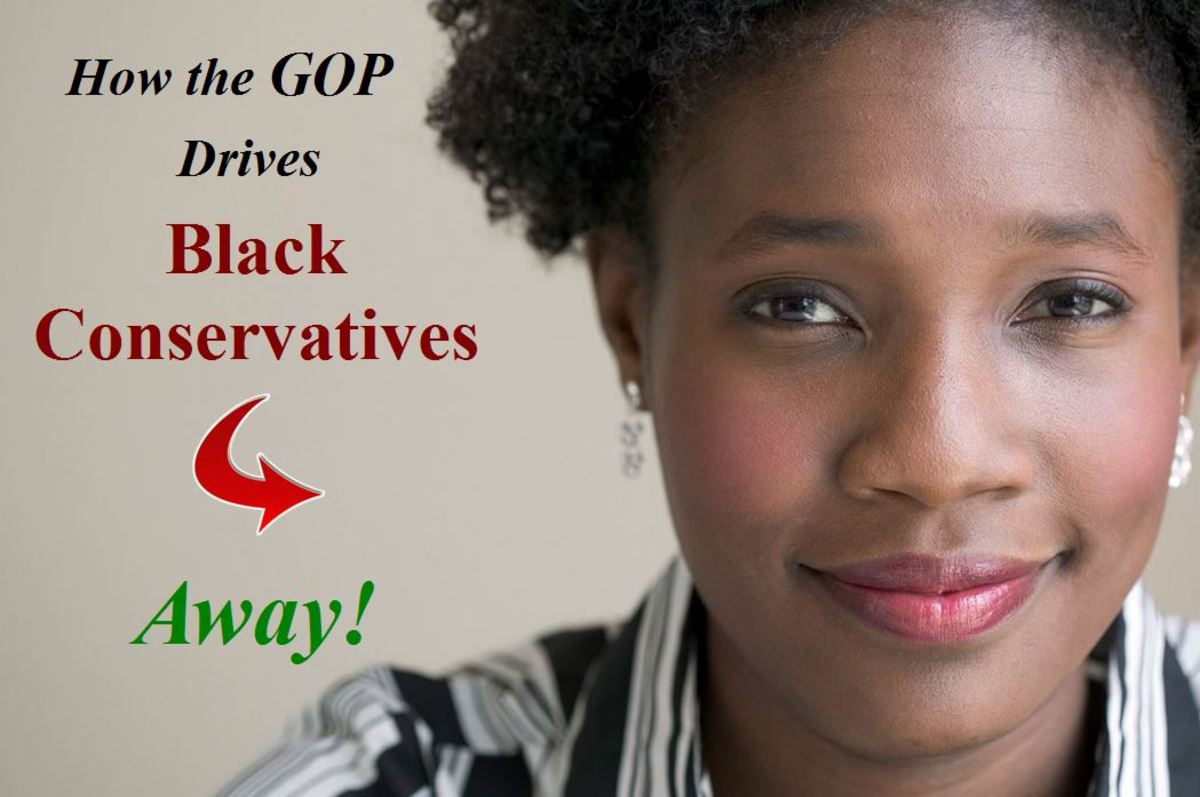How Do We Assist the African American Population to Achieve Equality in America?
What do African Americans really want?
Equality. A chance at being somebody without being treated as subhuman. Better education. Better jobs. Better pay. Better housing. Basically, the African American population, to me as a white man, desires what they perceive the White race as having. Additionally, they want to be treated as equal, not beneath the white race.
Is that it, in a nutshell? Admittedly, that is my perception of what I read and hear as the primary goals that they desire. Also admittedly, those are extremely reasonable requests. All Men Are Created Equal, it says so in the Declaration of Independence as penned by Thomas Jefferson more than two centuries ago.
And in all that time, apparently we have somehow managed to keep a significant portion of those who live on our shores less than equal.
So, what have we done to try and create equality?
The path to a better life lies in better education, in my opinion. In order to succeed in life, to make a better wage, have better benefits, get paid leave education is the key to a door to a better tomorrow. As it was said by Jamaal Bowman recently, these are what "his people" were looking for today, so I would assume we begin there.
Better jobs, better pay, better paid leave.
So, how does one get those perks, or rights, or rewards? One works, hard. One strives to get the best education one can. One stays away from the "easy route" of fame and fortune by not breaking the law, by not stealing, by not doing or dealing drugs, by doing the right thing, even if it is hard because it IS the right thing.
By staying in school. By taking the hard subjects and doing well. By studying. By getting good grades. By applying oneself to the task at hand and persevering through the adversity one has in their lives regardless of what they are told.
Not by dropping out. Not by taking easy courses. Not by quitting. Not by joining a gang and becoming one of what is already a losing culture.
Easy to say for an old white guy, I know. After all, I never had to face this in my life, right?
Yes, and yet, no.
I didn't have to face a gang but I did have adversity in my life.
I was never brought up or lived in an area that had heavy gang activity. There were drugs, quite a few drugs, in my high school. I knew those who did them, hung around with them. People even thought I was a "stoner" because of who I ran around with. I had people mixing drinks with pop in my car while driving around, had people rolling joints with me in the car, my car. I was pressured many times to take a drink, to take a hit, to take a puff but I refused. I caught hell, was called all kinds of things but I stood my ground.
I know, it is harder in the "hood". More pressure, more crime. More of all the bad elements that create the problems we are speaking of here. But it only takes one, then one more, then one more to say no and all of a sudden you have a movement within the very area you are trying to improve.
To me, the single most important issue here is education. Staying in school while doing what you can to improve yourself.
So, what are the actual numbers we are speaking about when it comes to schools, ACT's and such? Is there a difference worth noting, a difference that creates a real divide between the races? Enough of one that it really makes some people second class citizens in eyes of the world?
ACT Scores - By Race 2017 - 2018
Race/Ethnicity
| ACT Score
| |
|---|---|---|
White
| 22.2
| |
Black
| 16.9
| |
Asian
| 24.5
| |
Native American
| 17.3
| |
Hispanic/Latino
| 18.8
|
From "Inside Higher Ed" dated October 2018
- ACT scores drop; only Asian Americans saw gains
All racial and ethnic groups -- except for Asian Americans -- see declines.
By the numbers, it appears as though African Americans do not test well
These College Readiness Exams, or Entrance Exams or whatever one wishes to call them show that of the major ethnic groups, the African Americans are not scoring as high as other groups by a fairly significant margin. Does this mean they are not as intelligent? Or that they cannot learn?
In a study done by Fordham Institute in 2018, the 2016 median GPA (Grade Point Average) nationwide for affluent schools was 3.0. The GPA for lesser affluent schools was 2.59. Therefore, right off the bat one sees that schools with a higher level of personnel will get better grades. Why? A myriad of reasons, but one which stood out to me was that termed Grade Inflation. Not that there aren't other social and economic reasons, such as poorer kids having to work to help out their households, thus having less time to study, but having the chance to take harder courses, thus getting a weighted grade for a class will make a difference.
Is it possible that inner city schools simply do not offer weighted classes to their students? Very. After all, this would require a teacher with the skills to teach such a class, which would require a higher wage to attract such a teacher and the bottom line it that many poor schools simply do not have what it takes to woo a better, or higher grade of teacher to their schools. Teachers want to make more money too.
So, weighted classes on top of more time to do homework can and does make a difference. Anything else? Well, one thing that sticks in my craw as a parent is that I have seen, over the years, a significantly higher amount of "extra credit" being done by students today. If one does poorly on a test, one can do extra credit and make up a grade. Do you think a teacher in an inner city school who is making a lesser wage is going to spend extra time allowing students to make up grades by giving them extra work, thus requiring the teacher to grade extra work?
No.
- How Affirmative Action at Colleges Hurts Minority Students | The Heritage Foundation
On Dec. 9, the Supreme Court will hear oral argument in a case involving the University of Texas at Austin’s use of racial preferences in admissions. Though the Court has long accepted the practice of state-run schools factoring race and ethnicity in
How does this translate to colleges and universities?
So, attending high schools that are themselves handicapped by fewer teachers, lesser pay and time available is handicapping African American children before they even get to the work force. So, better jobs/pay and paid leave as a result of lower grades in school and limited learning are out the window for Dr. Bowman's people before we even move to higher learning establishments.
In a study of law schools across the nation, it was found that more than 50% of African American law students were in the bottom 10% of their classes. Many of these were admitted to these top law schools through Affirmative Action laws in place, in order to allow them a chance at a better life. So, if they get a "free pass" into a top law school via affirmative action, they are unable to capitalize on that chance because they were not prepared for these schools at the lower lever (high school) to begin with!
They literally are not set up to succeed! It would be like taking a middle school student and dropping them in college, or a kindergartner in middle school. If they do not have the tools, they will not succeed!
Giving someone something does not mean they are prepared to receive the gift, it simply means you threw someone a bone and walked away. If we do not properly prepare someone for college, all the breaks in the world may not make a hill of beans.
Back to me. I am not brilliant, but I am fairly intelligent. When I have taken an IQ test, I score borderline genius, MENSA level smart. But at college? I was an idiot. I was unable to focus, thus leading to my dropping out of school and never getting a diploma. The fact that I got in on a scholarship based upon my ACT score did not make a difference when it came to actually succeeding in school. And as a result, I have struggled all of my life to move up the ladder at work. I do okay, but the lack of a diploma means I have a limit to how high I can climb.
So, what can be done to help those who need help and deserve it?
How can we help the African American (and all races) to succeed? Free college isn't the answer; that already happens and it isn't showing real success. We have to do something at the lower levels to make a difference. I, for one, feel that forcing someone to attend school until they turn 17 is wrong. It keeps some people who are destined to be trouble makers in an environment where they can prey upon someone who might otherwise have a chance. It also ties up a teacher's time with someone who obviously doesn't care about school, both time and money-wise.
Test kids annually. See if they are progressing. If they have issues in school, if they are trouble and cause others trouble, do not force them to stay. Once they hit 16 years old, if they want to walk, let them. But I would then find a place for them, somewhere else away from the environment they are in. Maybe a military school style environment, giving them two years (until they hit 18) of a different culture and a change of their environment in order to offer a chance at a life away from the hood.
Invest more money, not less, in the budgets of schools in the cities. Remove sports as a reason for kids to attend, focus on scholastics. Affirmative action might not be shown as being effective, so remove mandated quotas and such, use college as a carrot not a guarantee. Use trade schools for those who might be fairly good at school but not quite college level. Change will come, but we as a nation must institute it and make it a priority. No more lip service, no more political promises unkept: force ourselves to change.
No change is easy, sometimes not even wanted by all. But to become equal, everyone must sacrifice for the good of the children. After all, they are our future, right?
This content is accurate and true to the best of the author’s knowledge and is not meant to substitute for formal and individualized advice from a qualified professional.
© 2020 Lee Franklin








